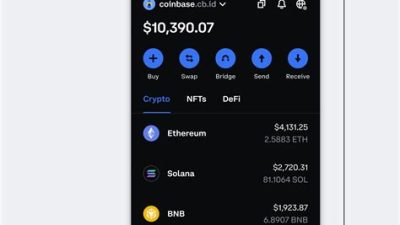
Thinking about diving into the exciting world of cryptocurrency? Two of the most popular platforms, Coinbase and Robinhood, both offer unique features that can make your crypto journey smooth and enjoyable. Whether you’re looking to trade Bitcoin, Ethereum, or other digital assets, figuring out which platform suits your style and needs is key. So, let’s unpack the differences and find out which one might be the best fit for you!
Understanding Coinbase
Coinbase is one of the most popular cryptocurrency exchanges in the world. Founded in 2012, it has become the go-to platform for many who are looking to buy, sell, or trade various cryptocurrencies. The user interface is designed to be straightforward, making it incredibly easy for beginners to navigate. When you first log into Coinbase, you’ll be greeted with a clean design that helps you quickly understand your portfolio, monitor prices, and execute trades. Moreover, Coinbase supports a wide range of cryptocurrencies, including Bitcoin, Ethereum, and many altcoins, giving users a broad spectrum of options to choose from.
One of the main advantages of using Coinbase is its security features. The platform employs strong encryption methods and even stores 98% of its customers’ funds in secure offline storage to prevent hacks and unauthorized access. This gives a peace of mind to users who might be worried about the risks associated with online trading. Additionally, Coinbase offers a clear guide for those who might be stepping into cryptocurrency trading for the first time, which can be incredibly beneficial for novices.
Additionally, Coinbase provides several tools to enhance the user experience. For example, it has a detailed educational section where users can learn more about different cryptocurrencies and how they function. There’s even a reward program where users can earn small amounts of cryptocurrency by completing educational tasks. This encourages users to educate themselves while giving them a little something in return. Just remember that with Coinbase, you’ll often face higher fees compared to other platforms, so it’s essential to factor those in when making your decision.
Exploring Robinhood for Crypto Trading
On the other hand, we have Robinhood, which has gained popularity due to its commission-free trading model. While initially focused on stocks, Robinhood now allows its users to trade cryptocurrencies through its platform seamlessly. What sets Robinhood apart is its mobile-first design and ease of use. Their app is designed for the millennial and Gen Z crowd, making it appealing to younger traders who prefer to manage their investments on the go.
Despite its simplicity, Robinhood does come with limitations when it comes to cryptocurrency trading. Unlike Coinbase, Robinhood only offers a limited selection of cryptocurrencies, which includes some of the most significant ones like Bitcoin and Ethereum but lacks the comprehensive range that Coinbase provides. Furthermore, the platform does not allow users to transfer their cryptocurrency out of the app to other wallets, which can be a significant drawback for experienced traders seeking to hold their coins securely or trade them elsewhere.
Another intriguing aspect of Robinhood is its unique feature of offering fractional shares of cryptocurrencies, allowing users to invest in small amounts without needing to buy a whole coin. This can make crypto investing more accessible for those who are just dipping their toes into the world of cryptocurrency. However, it’s crucial to note that Robinhood’s approach to crypto trading means you’re primarily dealing with a mobile app, which might not resonate with everyone. Users who prefer using a desktop platform may find Robinhood’s app-centric model limiting.
Fee Structures: Coinbase vs. Robinhood
When deciding between Coinbase and Robinhood for cryptocurrency trading, the fee structure is a vital aspect to consider. Coinbase typically charges a variety of fees, including a spread on trades and additional fees based on your payment method. For instance, purchasing with a credit card usually incurs higher fees than a bank transfer, making it essential for users to choose the method that aligns with their trading habits. The fees can range significantly, often falling into the higher end compared to other platforms, which is a consideration for frequent traders.
On the flip side, Robinhood operates on a commission-free model, meaning you won’t face any trading fees for buying or selling cryptocurrencies. However, it’s crucial to note that while there are no explicit trading fees, the price you pay for the cryptocurrency might be slightly higher than the market rate, which can effectively act as a hidden fee. So, while it appears attractive at first glance, users should be mindful of this aspect when trading on Robinhood, as it may affect the overall profitability of their trades in the long run.
In short, if trading fees are your primary concern and you’re looking to make small, infrequent trades, Robinhood might be the winner for you. However, if you are serious about long-term investing and want the freedom to explore various cryptocurrencies at potentially lower rates on larger trades, Coinbase could be a better fit despite its higher fees. Understanding the intricacies of each platform’s fee structure will help you make a more informed decision in your crypto journey.
The User Experience: Which Is Better?
User experience plays a significant role in how satisfied users are with a trading platform. Coinbase’s user interface is designed with the first-time user in mind. Crypto trading can be intimidating, and Coinbase recognizes this by providing an easy-to-navigate platform with in-depth educational resources to help users get comfortable with their investments. Moreover, their customer service is commendable, offering users multiple channels to seek help when they encounter issues. The simple dashboard displays all pertinent information, making it easy for users to monitor their portfolio’s performance and track market trends.
When it comes to Robinhood, the app is lauded for its minimalist design and quicker user experience. The trading process is streamlined; you can buy and sell cryptocurrencies within a few taps, which is appealing for those seeking efficiency. However, the lack of educational resources could be a disadvantage for beginners who might struggle to understand various market nuances. Robinhood’s focus is primarily on making trading as quick and straightforward as possible, and while that serves experienced traders well, beginners might find it overwhelming due to the absence of guidance.
Therefore, if you’re new to cryptocurrency and need a bit of hand-holding, Coinbase might provide an overall better experience for you. However, if you’re an experienced trader accustomed to the fast-paced nature of the trading environment, you might appreciate Robinhood’s speed and efficiency. The choice between the two platforms ultimately depends on your level of expertise and what you prioritize in a trading experience.
Final Verdict: Which One To Choose?
Deciding between Coinbase and Robinhood boils down to your personal preferences, trading habits, and what you’re looking to achieve in your crypto trading journey. For beginners, Coinbase tends to offer a more comprehensive experience due to its educational resources, user-friendly interface, and wider variety of cryptocurrencies. It’s a platform built with learners in mind and provides ample resources to help users navigate through their first steps in the crypto world successfully. Furthermore, its security measures give users an added sense of safety when trading.
On the other hand, Robinhood is ideal for someone who is looking for simplicity and speed. If you are focused on making quick trades without worrying about fees, Robinhood can be appealing. However, its limited selection and inability to transfer cryptocurrencies can be a deal-breaker for many seasoned traders. Additionally, the lack of comprehensive educational resources means that if you are new to crypto, you might find yourself at a disadvantage in understanding market mechanics and making informed decisions.
In conclusion, your choice should align with your trading strategy. If you are into hands-on, long-term investments with plenty of options and support, lean towards Coinbase. If you’re more of a casual trader looking to dabble in cryptocurrencies with a straightforward approach, then Robinhood might be the better choice. With both platforms offering distinct advantages, weigh them carefully to find out where your crypto journey should begin.
Comparing Features of Coinbase and Robinhood for Crypto Trading
1. User Interface and Experience
When it comes to trading platforms, a user-friendly interface can make all the difference, especially for beginners who are new to the world of cryptocurrency. Coinbase is designed with simplicity in mind, making it easy for users to navigate through their array of features. The layout is clean and straightforward, guiding users through the process of buying, selling, and managing their crypto assets. The mobile app also mirrors this ease-of-use, allowing users to trade on the go.
On the other hand, Robinhood provides a minimalistic design that appeals to its audience from the stock trading world. It preserves the clean aesthetics that have made it popular among new investors. However, some users find that Robinhood’s platform, while visually appealing, may not offer the same depth of market analysis tools that Coinbase does. In summary, both platforms cater to novice users effectively, but Coinbase provides more robust instructional materials, which can be invaluable for those just starting out in crypto.
2. Fees and Commissions
When selecting a platform for trading cryptocurrencies, the fee structure can heavily influence your overall experience and profitability. Coinbase charges a variety of fees that can add up, including transaction fees, spread costs, and conversion fees. For users purchasing crypto with a credit card, the fees can particularly sting, as Coinbase applies a fixed percentage rate that is at the higher end of the spectrum. However, their fees are somewhat transparent, and users are made aware of them before transactions are confirmed.
In contrast, Robinhood offers zero-commission trading for cryptocurrencies, which is a big selling point for new investors wanting to dip their toes without worrying about fees. This makes primary trades much more appealing. However, it’s important to note that while you won’t pay traditional fees directly to Robinhood, there is a spread, which could mean you might be getting a less favorable price for your transactions. Consider how often you trade and the size of your trades to determine which fee structure will serve you better in the long run.
3. Security Features
Security is paramount when it comes to trading cryptocurrencies, given the potential for hacks and fraud. Coinbase is known for its robust security measures; it stores 98% of customer funds in offline cold storage and ensures the remaining 2% on online servers are insured against theft. They also utilize two-factor authentication (2FA) for added security, ensuring that even if someone compromises your password, they would need additional information to access your account.
Conversely, Robinhood has a history of outages that have left some users concerned about its reliability during high-volatility periods. While Robinhood does employ encryption and other security measures, their focus has primarily been on a seamless user experience rather than extensive security features. This places Coinbase ahead in this category as many crypto enthusiasts prioritize the safety of their investments above all else.
4. Available Cryptocurrencies
The variety of cryptocurrencies available on a trading platform can greatly enhance your trading strategies. Coinbase offers a broad selection of cryptocurrencies, including popular options like Bitcoin, Ethereum, Litecoin, and thousands of altcoins. This diversity allows users to engage with a wider range of assets and find hidden gems in the crypto market.
Robinhood, while it supports some of the most popular cryptocurrencies such as Bitcoin, Ethereum, and Dogecoin, does not have nearly as extensive a library of coins as Coinbase. This could be a significant drawback for users who are looking to invest in lesser-known cryptocurrencies, which may offer higher returns. It’s crucial to evaluate your investment strategy and see which platform best aligns with your cryptocurrency ambitions.
5. Customer Support
Customer support can be a deciding factor for many when choosing a crypto trading platform. Coinbase provides support through various channels such as live chat, email, and a dedicated help center filled with FAQs and guides. However, some users have reported long response times during peak trading hours, which can be frustrating for those in urgent need of assistance.
Robinhood’s customer support is somewhat limited in comparison; they primarily offer help through email and an online help center. Users have expressed frustration with the lack of direct, real-time support options, especially during times of high volatility. Depending on your personal needs—especially if you anticipate needing help often—this might influence your overall satisfaction with the platform.
FAQs: Coinbase vs. Robinhood for Crypto Trading
1. Which platform is better for beginners?
Coinbase is generally considered more user-friendly for beginners, thanks to its educational resources and intuitive interface.
2. Are there any hidden fees with Robinhood?
While Robinhood does not charge commissions, there may be a spread that can affect the price at which you buy or sell crypto.
3. Can I transfer my crypto from Coinbase to another wallet?
Yes, Coinbase allows users to transfer their crypto assets to external wallets for better security.
4. Does Robinhood offer a desktop version?
As of now, Robinhood primarily operates through its mobile app without a dedicated desktop platform.
5. Is my crypto safe on Coinbase?
Coinbase is known for its strong security measures, including insurance for funds in offline storage.
6. How can I learn more about cryptocurrency on Coinbase?
Coinbase offers an extensive array of educational resources to help users learn about cryptocurrency and investing strategies.
7. Can I stake my crypto on Coinbase?
Yes, Coinbase allows users to stake certain cryptocurrencies, letting you earn rewards over time.
8. Does Robinhood support all cryptocurrencies?
Robinhood only supports a limited selection of cryptocurrencies as compared to Coinbase.
9. What happens if Robinhood goes bankrupt?
If Robinhood goes bankrupt, your investments may not be protected in the same way as those stored in a more secure wallet.
10. Are there trading limits on Coinbase?
Yes, depending on your level of verification and account history, there may be trading limits on Coinbase.
11. Can I use Coinbase and Robinhood at the same time?
Absolutely! Many users choose to use multiple platforms to take advantage of their respective features.
12. Is there a mobile app for Coinbase?
Yes, Coinbase has a mobile app available on both iOS and Android, providing easy access to your account.
13. Can I integrate Coinbase with other wallets?
Yes, Coinbase can be integrated with several external wallets for added convenience.
14. Does Robinhood offer a referral program?
Yes, Robinhood does have a referral program that rewards users for bringing new members to the platform.
15. How can I contact customer service at Coinbase?
You can contact Coinbase’s customer service through their help center, via email, or through their live chat feature.
Thanks for Stopping By!
We hope this little dive into the world of crypto trading on Coinbase and Robinhood has helped clear things up for you! Whether you’re gearing up to make your first purchase or just want to learn more about your options, it’s all part of the fun. Thanks for reading, and don’t forget to swing by again soon for more insights and updates. Happy trading!











